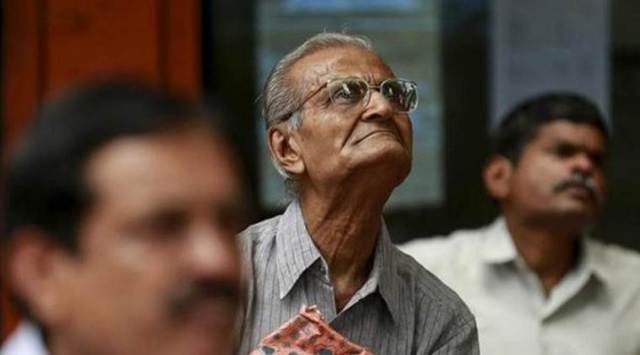Union Budget 2023: Deposit limit for senior citizens’ scheme hiked, new savings scheme for women
The maximum deposit limit for Monthly Income Scheme Account for senior citizens has been enhanced from Rs 4.5 lakh to Rs 9 lakh for a single account, and from Rs 9 lakh to Rs 15 lakh for a joint account.
 Mohali launches online hearing for senior citizens in maintenance cases. (Representational/File)
Mohali launches online hearing for senior citizens in maintenance cases. (Representational/File) The Union Budget has proposed more incentives to senior citizens and women to save more money at a better interest rate. Finance Minister Nirmala Sitharaman announced a new savings scheme for women and hiked the limit for Senior Citizens Savings Scheme and Monthly Investment Scheme (MIS).
Presenting the Union Budget, Sitharaman said a one-time new small savings scheme, Mahila Samman Savings Certificate, will be made available for a two-year period up to March 2025 for commemorating Azadi Ka Amrit Mahotsav. This will offer deposit facility up to Rs 2 lakh in the name of women or girls for a tenure of two years at a fixed interest rate of 7.5 per cent with partial withdrawal option. The interest rate under this scheme is higher than the rates offered by banks for a similar period.
On the other hand, the maximum deposit limit for Senior Citizen Savings Scheme will be enhanced from Rs 15 lakh to Rs 30 lakh. The current interest rate on this scheme is 8 per cent, higher than most bank deposit rates. However, it has a lock-in period of five years. The total outstanding in this scheme as of February 2022 was Rs 1,17,239 crore, according to RBI data.
The maximum deposit limit for Monthly Income Scheme Account for senior citizens has been enhanced from Rs 4.5 lakh to Rs 9 lakh for a single account, and from Rs 9 lakh to Rs 15 lakh for a joint account.
Bankers said the increment in the limit for senior citizens’ savings schemes will help senior citizens and retired investors to plan their investments better. “However, in our estimate, the impact of these (sops) is likely to be limited. Schemes such as 7.5 per cent on Mahila Samman Savings Certificate would not impact much as some banks are already offering competitive rates on deposit of this tenor,” said Prakash Agarwal, Director & Head, Financial Institutions, India Ratings and Research.
“We may see some shift of funds to the senior citizens’ saving scheme and monthly income account which would continue to put pressure on deposit accretion of banks. Having said that, the government’s limited borrowing programme has had a cool-off effect on bond yields already and would also leave larger funds for credit deployment,” said Agarwal.
TDS threshold on winnings from online gaming removed
By Soumyarendra Barik
The Union Budget for 2023-24 has proposed a 30 per cent tax on “net winnings” from online games and has also removed the existing minimum threshold limit of Rs 10,000. Earlier, tax deducted at source (TDS) was calculated on the minimum threshold limit. Revenue secretary Sanjay Malhotra said during a post-Budget briefing: “Taxation will now be on net winnings since the nature of online gaming is such that one plays several games in a series.”
Explaining the rationale of removing the threshold, he said that some companies were keeping the winnings lower at Rs 10,000, to avoid the TDS provisions. Online gaming firms have welcomed the move, saying that the proposal creates a demarcation between online games and gambling. However, some industry executives raised questions over how net winnings would be calculated for platforms that offer a bunch of games.
Soon, a national framework to share anonymised data
The Centre is working on a national data governance policy to enable access to anonymised data to start-ups in order to boost innovation, Finance Ministry Nirmala Sitharaman said. In May 2022, the Ministry of Electronics and IT had floated a draft of the policy which proposed that private companies will be “encouraged” to share non-personal data with startups and Indian researchers through an initiative called the India Datasets programme.
As per the draft, the programme will also house non-personal data of Indians collected by the Centre. Experts had earlier indicated that the draft could face pushback, given that private companies are unlikely to be keen on voluntarily sharing non-personal data as there could be trade and IP issues. It was introduced after MeitY scrapped an earlier proposal to monetise government data, which had drawn the ire of privacy activists.
Foreign funding in start-ups could attract ‘angel tax’
Start-ups that offer their shares to foreign investors such as Tiger Global and Sequoia Capital as part of fundraising rounds will have to pay “angel tax”, according to a proposal made in the Finance Bill, 2023. The move could affect financing available to the country’s start-ups which have already been reeling under a funding winter since 2022.
Until now, these provisions were applicable only to local resident investors. But now the ambit has been widened to check tax avoidance. The angel tax was first introduced in 2012 to deter the generation and use of unaccounted money through the subscription of shares of a closely held company at a value that is higher than the fair market value of the firm’s shares. Funding for India’s startups dropped by 33 per cent to $24 billion in 2022 from the previous year, according to a PwC India report in January.
Union Budget 2023: All you need to know
- ↗️ Finance Minister Nirmala Sitharaman’s Union Budget 2023 has some big takeaways
- ↗️ First, what everyone has been looking forward to: changes in the new income tax regime. She has made the new tax regime more attractive. There are changes in the rebate limit and in tax slabs. What does this mean for the taxpayer?
- ↗️ FM Sitharaman proposed a 33% increase in capital investment outlay, raising it to Rs 10 lakh crore. This is the biggest in the past decade. What does it mean?
- ↗️ Some articles get cheaper and others get costlier due to changes in customs duty. Here is a list
- ↗️ The capital outlay for the railways has been increased to the highest ever – Rs 2.40 lakh crore. The government is trying to create more jobs
- ↗️ FM Sitharaman said the fiscal deficit will fall to 5.9% of the GDP. What does it mean for the stakeholders?
- ↗️ The FM called it the ‘first Budget of Amrit Kaal’. PM Narendra Modi said it will build a strong foundation for a developed India. What did opposition leaders say?
Photos





- 01
- 02
- 03
- 04
- 05

























